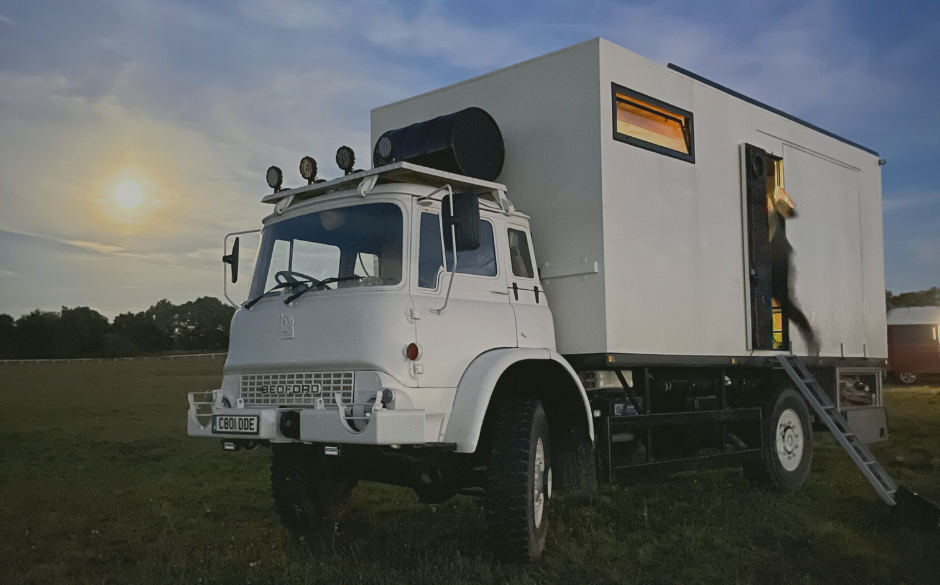Jess and Dan’s journey into off-grid living took them from busy urban life to the backroads of rural Britain. There they found a simpler, more meaningful way to live. As self-confessed ‘recovering capitalists’, their shift away from conventional careers and towards a life in their custom-built off-grid house truck was driven by a desire for a more alternative and adventurous lifestyle. Now, they spend their time working the land and enjoying the freedom to follow their own path.
Their off-grid house truck is more than just a vehicle. It’s a practical and thoughtful setup designed to meet their needs for both sustainability and home comforts. But their journey hasn’t been without its challenges. Like many choosing this path, they’ve had to find creative solutions to build their home and adapt to this lifestyle.
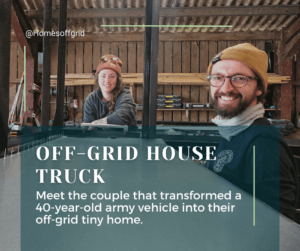
In this article, you can explore why Jess and Dan chose to go off-grid, their unique and quirky setup, and how they’ve adapted to this unconventional lifestyle in a house truck. Have you ever dreamed of stepping off the treadmill and living more intentionally? Jess and Dan’s experiences might offer the inspiration you need.
Background and Motivation
Jess and Dan both came from business backgrounds. Like many others, they were caught up in the cycle of property ownership, mortgages, and the endless upkeep of modern life. Yet, each of them knew they wanted to break away from their conventional lives tied into the grid. “We always found the comfort zones of on-grid rentals and urban design sucked us into not feeling truly alive. We wanted to feel more – our will power just wasn’t great enough in those settings,” Jess explains. They also wanted to have more financial freedom. Dan is currently re-training in agroecology while Jess has autoimmune and chronic health issues meaning she has had to reduce her work hours. Managing these challenges alongside the high costs of modern life would have been far more difficult.
Their journey into off-grid life has evolved over time. They had both experienced Vanlife before, first in a temperamental Luton van then a more modern Fiat Ducato campervan. They enjoyed the connection it provided with the outdoors and wild places. “One of the struggles we found when living full-time in a van as a couple was space. That was the main driving force in going bigger this time. If one of us falls ill or needs to sleep-in we now have enough space for the other to make some food, work or relax without disturbing the other.” Last year Jess and Dan bought a 40-year-old lorry. With some help, they had it custom-built into their current home – a completely original off-grid house truck. They moved into their converted home this year.
Out of the different forms of off-grid living this couple specifically chose to build their house truck. “Our off-grid home is mobile which allows us to move home without moving house. We can follow opportunities, escape bad weather and start over somewhere new without losing the day-to-day comforts and familiarity of our own home.” The ability to travel and take your home with you is a common reason for people to transition to a mobile off-grid home. You have freedom and flexibility. You can explore and keep moving, or stay somewhere to work or relax for a little while.
Current Off-Grid Setup
Jess and Dan’s off-grid house truck has been designed to meet their needs for flexibility, energy efficiency, and mobility. Built on a 1985 4×4 Ex-Military Bedford MJ, the vehicle has been custom-converted into a spacious and practical home. While the build isn’t completely finished, Jess and Dan have managed to make it fully livable. They’ve incorporated a variety of off-grid systems that allow them to live comfortably wherever they go.
At the heart of their setup is a solar power system with 1300 watts of solar capacity on the roof, and a 3000W inverter for support. This provides them with the energy needed to run their appliances and devices. “We don’t want to compromise so we have high-energy appliances like a Truma diesel heater and aircon unit and an air fryer. Of course, these need a big solar bank, inverter and battery system (which we’ve not got quite right yet but have plans for an upgrade)! We subsidise this with intelligent appliances like our shoreline 12v Shoreline fridge and our 12v LED light system,” says Jess. They also have a log burner they use for heat, hot water and cooking instead of relying on only electricity.
Their future plans include investing in larger-capacity Lithium batteries to store more power. They also intend to get a backup generator to reduce reliance on external charging sources. With the increase in energy storage, they’ll be able to run more electrical systems, even during periods of low sunlight.
For water, the couple is still refining their off-grid solution. “At the moment we have 2x 250L tanks and a filtration system. We can go 2 weeks before refilling.” This was important for the couple as they often struggled to source water when they travelled in a smaller vehicle and didn’t enjoy this particular challenge. In the future, they are planning to install a rainwater capture system. This means they will be able to collect water and filter it straight off the roof of their truck. They will reduce their need for frequent refills and ensure a more sustainable water source while parked in remote areas.
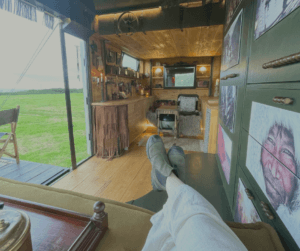
Waste management can be another tricky aspect of off-grid living, especially in a vehicle. “Luckily there have been waste bins on the properties we have stayed on so far. We plan on being in places in the UK for long periods and eventually finding some land for good. So we will have composting systems being evolved as we go. We dry our coffee grounds and pop some in the compost toilet which we have found works well. This gets emptied regularly. We also have a fluids funnel, which is a game changer for if we are on the run and need a wee!”
One of the most distinctive aspects of their setup is its location flexibility. Because their home is mobile, they are free to move between locations based on the seasons, weather, or work opportunities. “We tend to stay on local farms. We have been based in Shropshire surrounded by beautiful farmland and we have met some fantastically generous and hospitable farmers who have been happy for us to park up in a corner of a field and make ourselves at home for a small amount of rent.”
Next year, Jess and Dan plan to continue improving their truck, not just in terms of its off-grid systems but also the exterior look. “We have a lot we want to do on the exterior, being really playful and creative with it, as well as adding some innovative off-grid systems. It’s just a big square box at the moment so a blank canvas for a design-minded person like Jess,” Dan explains.
Challenges and Learning Curves
As with many who embark on an off-grid journey, Jess and Dan encountered their fair share of challenges, particularly in the early stages of building their house truck. One of the main hurdles they faced was finding the right contractors to help with the conversion. “We now have an amazing team which we can highly recommend. However, we had some difficult experiences in the early days with people who didn’t really understand mobile-home construction,” Jess admits. It’s a common issue for those looking to build custom mobile homes. Not every contractor is familiar with the specific demands of a vehicle that must function both as a roadworthy truck and a comfortable, energy-efficient home. The couple emphasised the importance of working with professionals who have experience in off-grid setups and vehicle conversions to avoid costly mistakes or delays.
Financial limitations were another challenge for Jess and Dan, as the costs of building a custom home can quickly escalate. This meant they had to be mindful of how they spent their budget, particularly when it came to sourcing materials. “We used recycled/reclaimed materials and shopped around wherever possible. Antiques shops and scrapyards became our version of the high street or internet shopping. We found some great individual features at low prices.” Dan explains. From repurposed wood to reclaimed fittings, their house truck reflects a sustainable and practical approach which allows the couple’s soulful style to shine through.
Efficiency of space was another key consideration. The couple knew they needed to make the most of every square metre inside their truck. “It forces you to be more efficient. You only own what you need or what you love, there isn’t room for any excess. Everything performs a function or multiple functions, so the initial design stage has to be smart and well thought out,” Jess notes. Their truck is full of clever design features such as multi-functional storage solutions and dual-purpose furniture. These features maximise both living space and storage capacity. These features are essential in a mobile home where every inch matters. By focusing on versatile design and sustainable materials, they’ve created a home that not only meets their practical needs but also reflects their values and personalities.
One of the key lessons Jess and Dan learned early on was the importance of working with experience. “We’ve been lucky to connect with some very talented and experienced people who help and advise us with anything we find ourselves out of our depth with,” Dan explains. The couple realised early on that having the right support could make all the difference. This is especially when dealing with mechanics, electrics, or any part of the build that requires specialist knowledge. For anyone considering a similar path, they advise seeking out trusted professionals who understand the complexities of these alternative off-grid homes.
For those new to this lifestyle, Jess and Dan recommend to “trial it first! Not because it might not be for you, it probably will be. But there are so many ways, so many systems, so many designs / layouts! Try them all first. Go to as many shows as you can, like Vanlife Festival or the Adventure Overlander Show. You will be so inspired and find your style and preferences, which is so important when you are doing something out of the ordinary”! The couple have had around 5 years of experience living in vans and the Luton truck. This time was invaluable to work out if it was for them and what they needed. Their build is completely bespoke to their needs, but you don’t really know what your needs are until you live (not just adventure) in a tiny home.
Daily Life and Routine
Jess and Dan’s daily routine off-grid is designed around flexibility. This allows them to adapt depending on their freelance work or location. Their mornings always start with coffee, which has become a central part of their routine. “Our day starts with coffee in bed or on our drop-down deck if it’s sunny,” Jess explains. They have four different coffee-making options – the coffee machine, a Nano-Presso, a percolator and instant, ensuring they can always start the day the way they like!
One of the key features of their truck is an elevator bed system, which helps them make the most of the available space. “The bed is easily wound up to the ceiling and put away for the day,” Jess says, adding that the open-plan layout means there’s always flexibility. If Jess is poorly, she can rest on the bed area, and Dan still has half the truck to use. This versatile space includes a large daybed that serves multiple purposes – work, dining, socialising and even as a spare bed when needed.
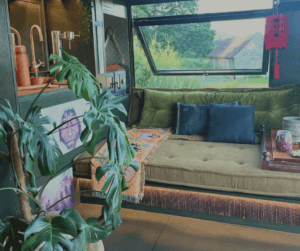
Evenings bring a routine of winding down and organising their space. After cooking dinner together, they finish the day by tidying the kitchen. This has become a key part of their daily rhythm. “We have created a really meditative clean-down moment for the kitchen so we can get the bed down,” Jess explains. “I hate washing up but because it just has to be done every day it’s become our routine before the bed goes down. It’s turned into a really nice moment, usually by candlelight, dancing about to music.” Their daily life reflects the flexibility and practicality of their off-grid setup. They balance the freedom to work when needed with routines that help keep their small space organised.
Impact of Off-Grid Living on Their Relationship with Nature
Jess and Dan’s connection with nature has deepened since transitioning to off-grid living, with their lifestyle encouraging a more intentional relationship with the environment. “This is a key reason we wanted to live this way. You are so much more connected. The weather becomes such a strong element in your life, feeling rainstorms, jumping out barefoot onto grass, being able to live in different environments. It’s incredible”!
The couple recently found themselves outside one night watching the Aurora Borealis from the roof of their house truck. They admit that before off-grid living they would have been inside watching Netflix instead of a fire or the stars. “There’s nothing wrong with Netflix at all. We still have our subscription and love a box set but personally a night sat around the fire under the stars wins out every time!”. Jess and Dan set out to transition to a life which was less connected digitally, and more connected to nature, the wild and a community. Their new lifestyle aligns perfectly with this and allows them to have plenty of adventures wherever they travel.
Community and Social Interaction
While Jess and Dan enjoy solitude, they’ve found that community remains an important part of their off-grid lifestyle. “We can both be quite introverted and enjoy time on our own in quiet spaces,” Jess says. However, they enjoy connecting with others when they choose to dip into the more social side of things. ” We live in a way that is a little different from most so people you meet tend to be interested. They start asking a few questions, you get chatting and before you know it, you’re having a drink, sharing stories and making new friends.”
During longer stays on farms, they’ve found opportunities to connect with local communities. “We do often get to connect with the communities on site. We will often offer to help out with any jobs at the farm if extra bodies are needed. Usually, we become a part of the background team.” They also note the practical benefits of these connections, explaining that farmers “are handy people to know. More often than not, they have barns full of tools and toys which may be handy for us.”
In addition to their local connections, they’ve become more involved in the wider off-grid community. Although still relatively new to it, Dan says, “We have made some fantastic connections already and hope to expand on this over time.” They’ve experienced a warm welcome, with community members who have been generous with their time and help. “It’s been amazing working with experienced people on our build who have then invited us to meet-ups and introduced us to more people living this life.”
The Next Step
Aside from upgrading their house truck systems and exterior look, Jess and Dan have lots of exciting new plans and projects for their off-grid future. Jess has been invited to look at interiors for live-in vehicles. She’s enjoying taking time from commercial interior projects for these more playful and meaningful spaces. “It has been fulfilling creating spaces in the overlander and Vanlife space that feel not only luxurious but also personal, which in the professional commercial space of van and truck building there seems to be a void” Jess shares.
“The main goal is to have our own patch of land to use as a headquarters. Then we’ll continue to use a network of friendly and suitable farm locations when we want to move around the UK and eventually into Europe and beyond,” they explain. Ultimately the pair are looking to set up an off-grid community based around community agroecological farming and rewilding. “We will be evolving this with a core group in 2025. We’re really excited to move into the next steps of our wider, wilder, off grid vision.”
Conclusion
For Jess and Dan, the rewards of off-grid living go beyond practicalities like sustainability and self-sufficiency. It’s about freedom, creativity, and a deeper connection to life and nature. Reflecting on their journey, Jess says, “Start now, there’s no better time, you won’t regret it!”
Their off-grid lifestyle has allowed them to embrace more meaningful experiences, from connecting with nature to exploring new communities. They express immense gratitude to those who have helped along the way. “Huge thank you to everyone who has helped us so far, our amazing build team and anyone who has let us stay with them for a while. We appreciate it more than you know!”
As Jess and Dan settle into life in their off-grid house truck, they remain excited about the possibilities ahead. You can follow their journey and projects on Instagram @roamers_hq.
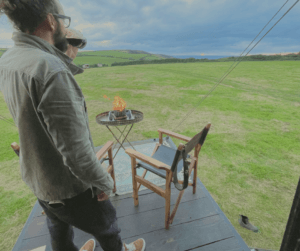
To find out more about off-grid living return to our Reading Room.


